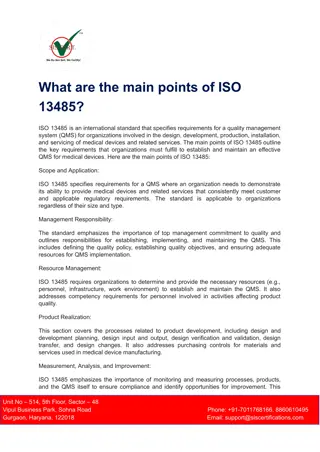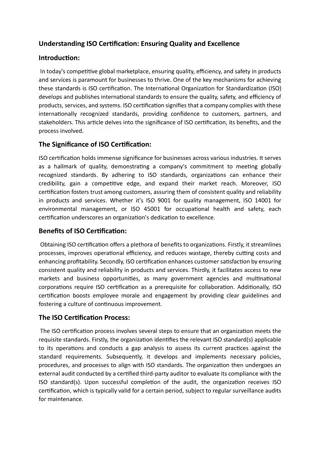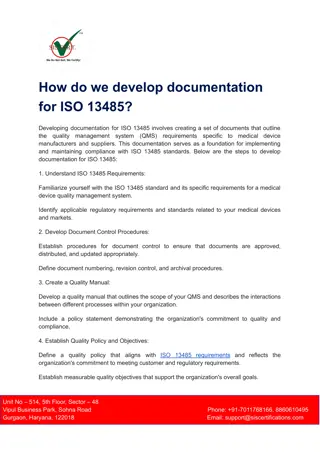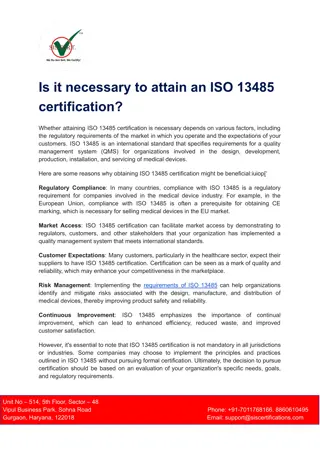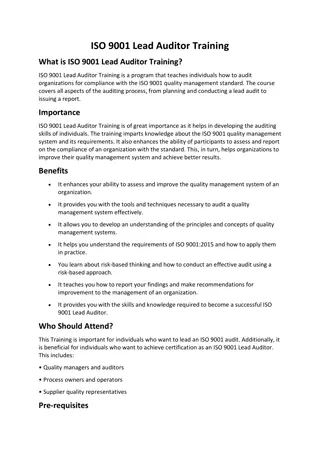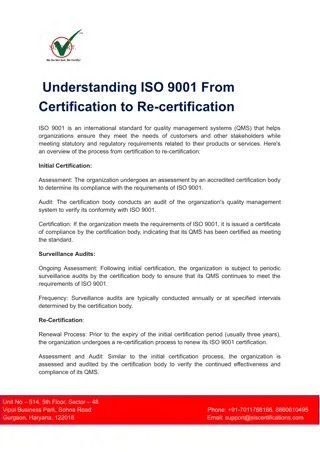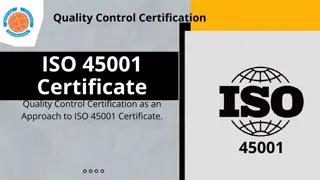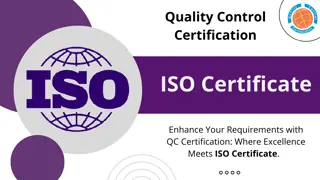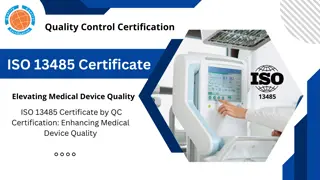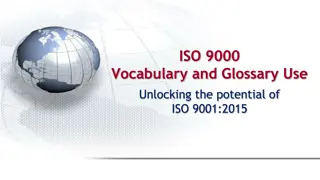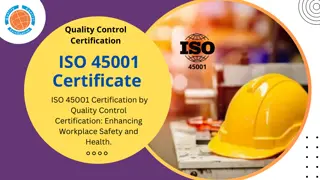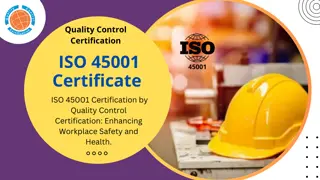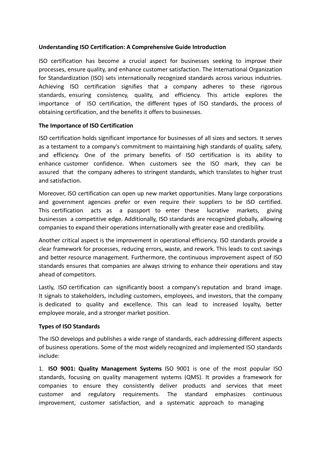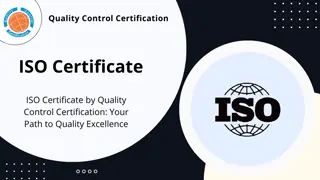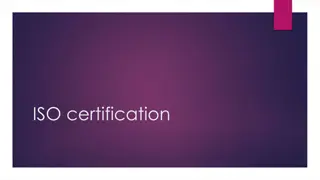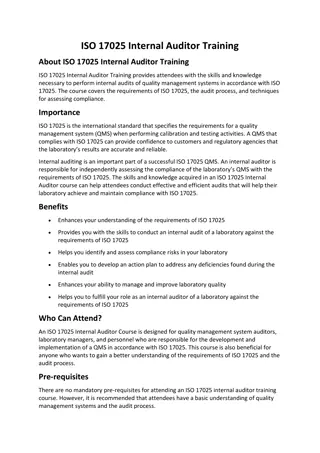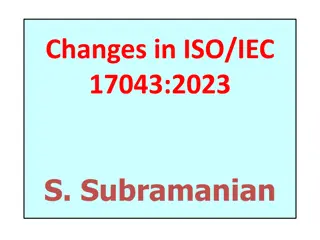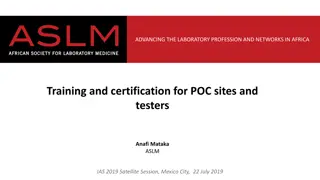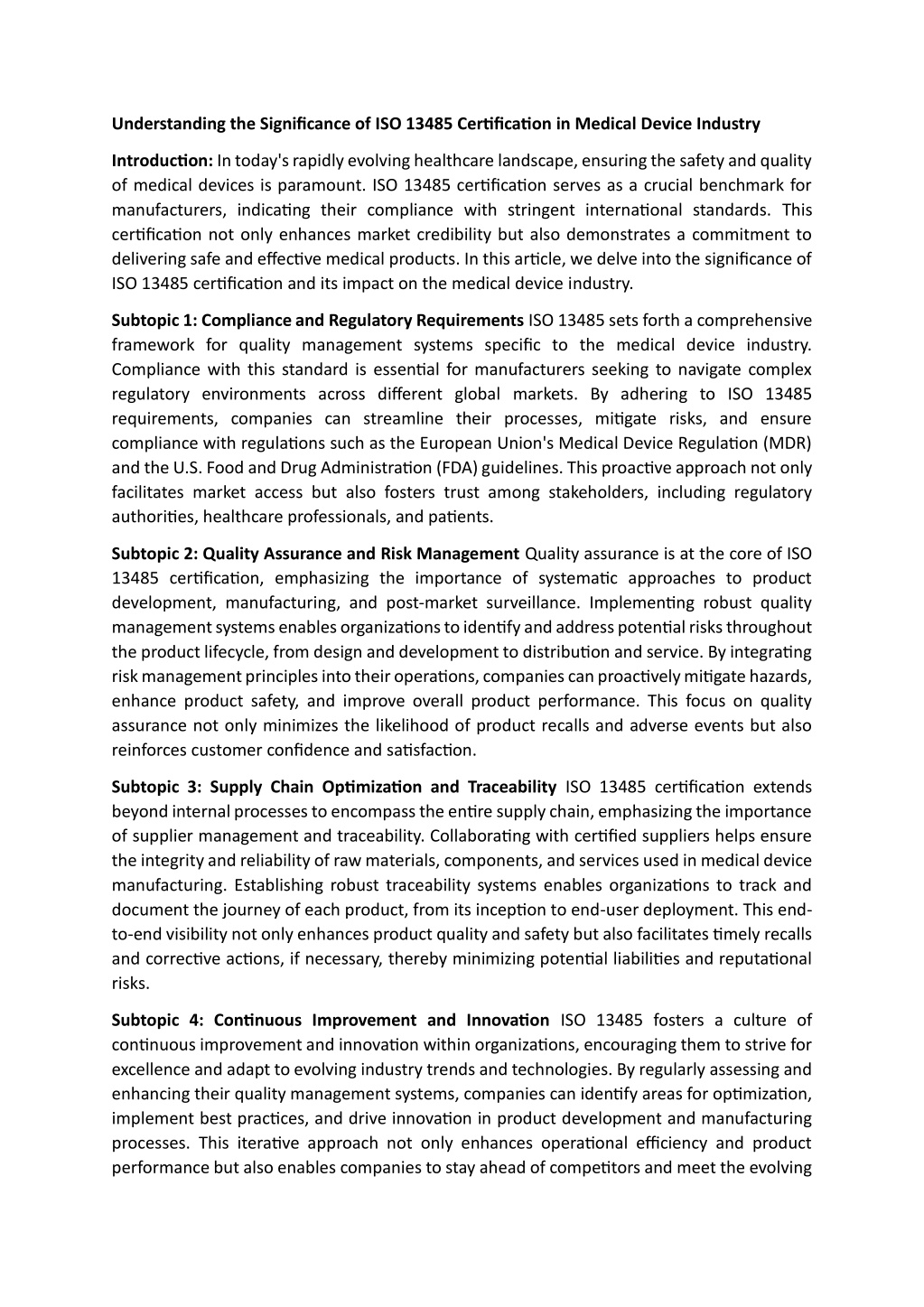
iso 13485 certification south africa
ISO 13485 is an internationally recognized standard for a quality management system, especially for medical devices and equipment. The requirements of the ISO 13485 apply to any organization, regardless of size, that develops and provides medical devices. This standard also applies equally to the associated services that the organization provides.nn
Download Presentation

Please find below an Image/Link to download the presentation.
The content on the website is provided AS IS for your information and personal use only. It may not be sold, licensed, or shared on other websites without obtaining consent from the author. If you encounter any issues during the download, it is possible that the publisher has removed the file from their server.
You are allowed to download the files provided on this website for personal or commercial use, subject to the condition that they are used lawfully. All files are the property of their respective owners.
The content on the website is provided AS IS for your information and personal use only. It may not be sold, licensed, or shared on other websites without obtaining consent from the author.
E N D
Presentation Transcript
Understanding the Significance of ISO 13485 Certification in Medical Device Industry Introduction: In today's rapidly evolving healthcare landscape, ensuring the safety and quality of medical devices is paramount. ISO 13485 certification serves as a crucial benchmark for manufacturers, indicating their compliance with stringent international standards. This certification not only enhances market credibility but also demonstrates a commitment to delivering safe and effective medical products. In this article, we delve into the significance of ISO 13485 certification and its impact on the medical device industry. Subtopic 1: Compliance and Regulatory Requirements ISO 13485 sets forth a comprehensive framework for quality management systems specific to the medical device industry. Compliance with this standard is essential for manufacturers seeking to navigate complex regulatory environments across different global markets. By adhering to ISO 13485 requirements, companies can streamline their processes, mitigate risks, and ensure compliance with regulations such as the European Union's Medical Device Regulation (MDR) and the U.S. Food and Drug Administration (FDA) guidelines. This proactive approach not only facilitates market access but also fosters trust among stakeholders, including regulatory authorities, healthcare professionals, and patients. Subtopic 2: Quality Assurance and Risk Management Quality assurance is at the core of ISO 13485 certification, emphasizing the importance of systematic approaches to product development, manufacturing, and post-market surveillance. Implementing robust quality management systems enables organizations to identify and address potential risks throughout the product lifecycle, from design and development to distribution and service. By integrating risk management principles into their operations, companies can proactively mitigate hazards, enhance product safety, and improve overall product performance. This focus on quality assurance not only minimizes the likelihood of product recalls and adverse events but also reinforces customer confidence and satisfaction. Subtopic 3: Supply Chain Optimization and Traceability ISO 13485 certification extends beyond internal processes to encompass the entire supply chain, emphasizing the importance of supplier management and traceability. Collaborating with certified suppliers helps ensure the integrity and reliability of raw materials, components, and services used in medical device manufacturing. Establishing robust traceability systems enables organizations to track and document the journey of each product, from its inception to end-user deployment. This end- to-end visibility not only enhances product quality and safety but also facilitates timely recalls and corrective actions, if necessary, thereby minimizing potential liabilities and reputational risks. Subtopic 4: Continuous Improvement and Innovation ISO 13485 fosters a culture of continuous improvement and innovation within organizations, encouraging them to strive for excellence and adapt to evolving industry trends and technologies. By regularly assessing and enhancing their quality management systems, companies can identify areas for optimization, implement best practices, and drive innovation in product development and manufacturing processes. This iterative approach not only enhances operational efficiency and product performance but also enables companies to stay ahead of competitors and meet the evolving
needs of healthcare stakeholders. Embracing a culture of continuous improvement not only enhances organizational resilience but also reinforces the long-term sustainability and success of the medical device industry. Conclusion: In conclusion, iso 13485 certification south africa plays a pivotal role in ensuring the safety, quality, and compliance of medical devices in today's dynamic healthcare landscape. By embracing the principles and requirements of this standard, manufacturers can enhance market credibility, mitigate risks, and foster a culture of continuous improvement and innovation. Moreover, ISO 13485 certification underscores a commitment to patient safety and regulatory compliance, ultimately contributing to the advancement of healthcare outcomes worldwide. As the medical device industry continues to evolve, ISO 13485 certification remains indispensable for organizations seeking to thrive in a competitive and highly regulated market environment.


